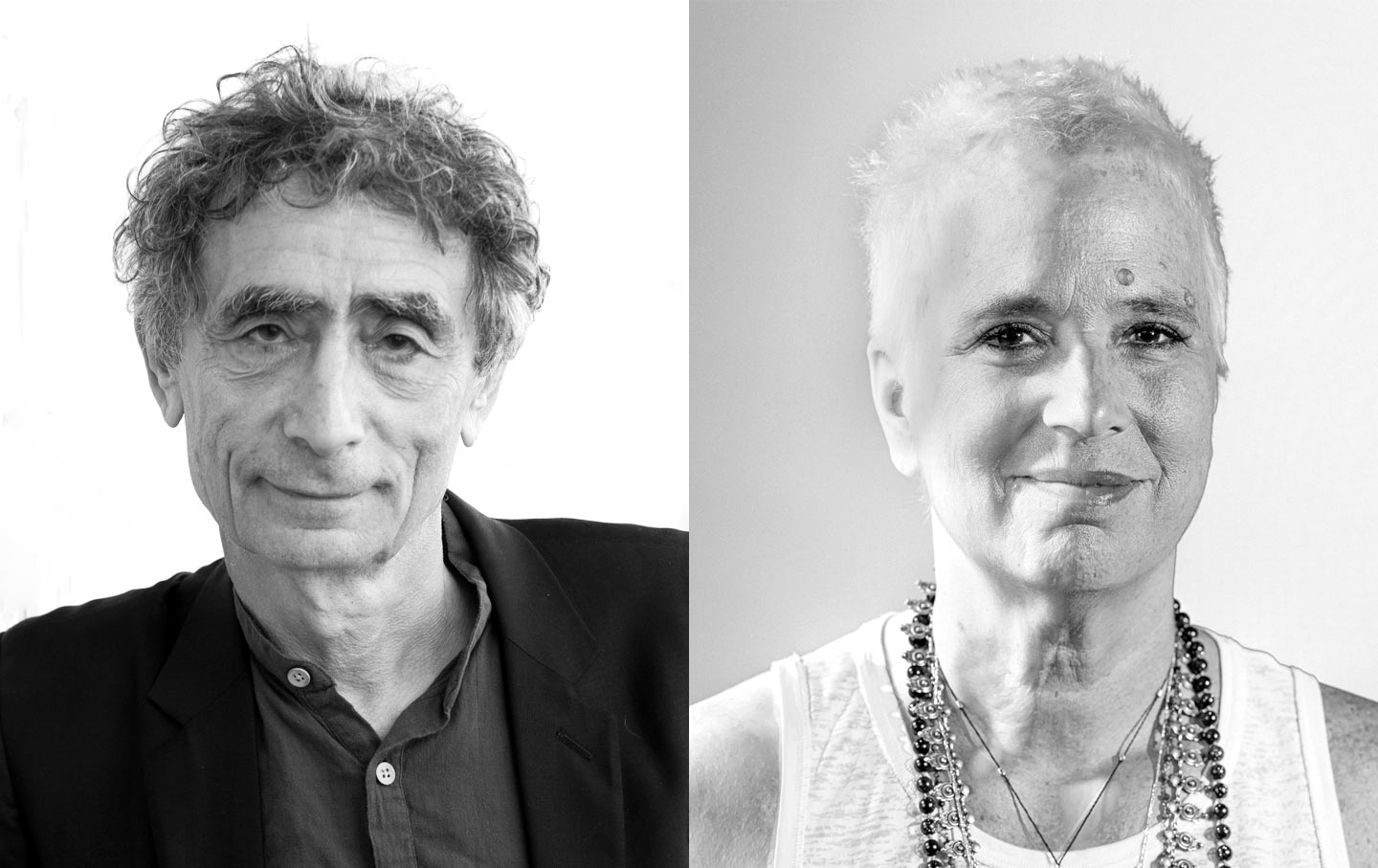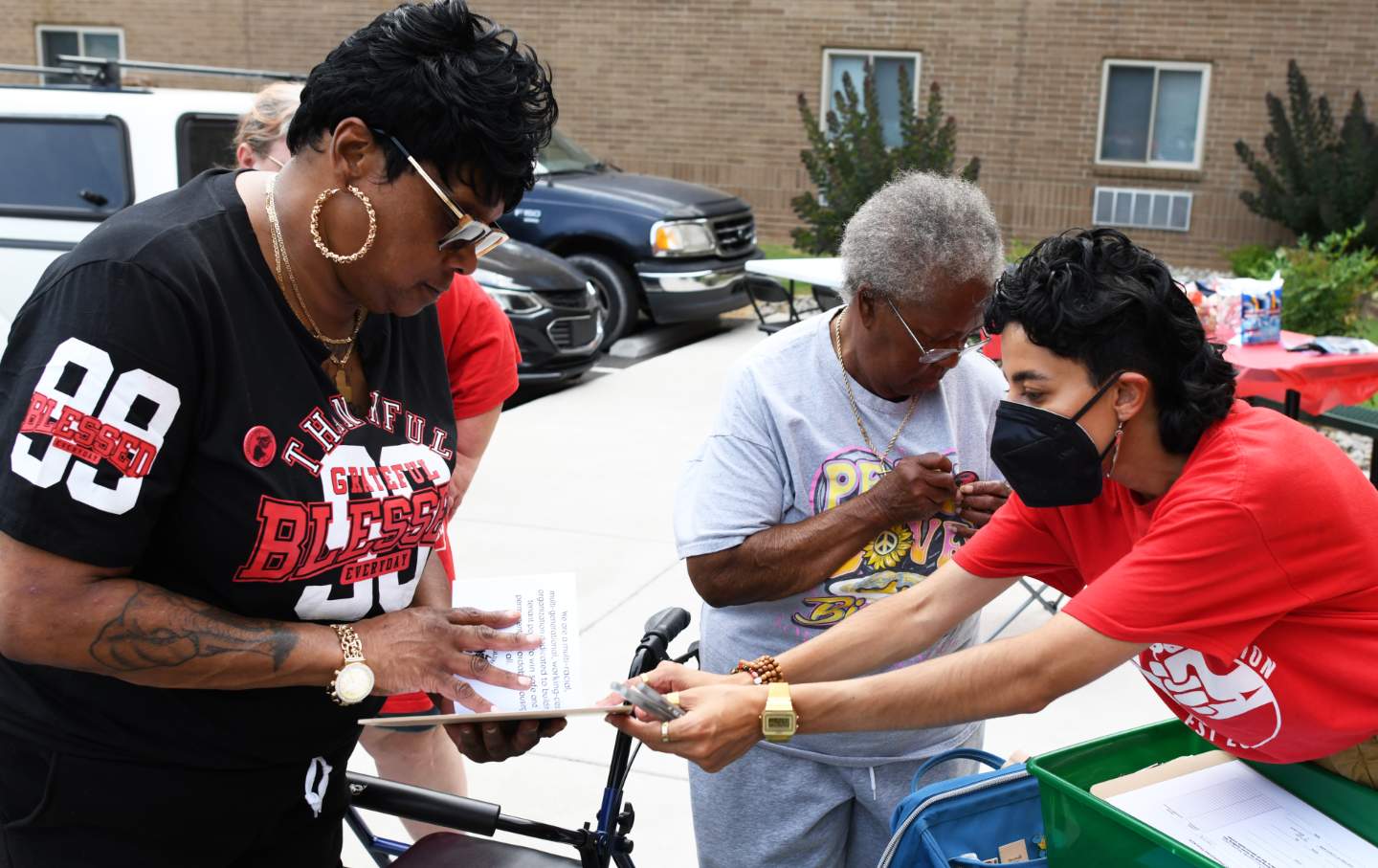
Gabor Maté; V, formerly Eve Ensler.
(Courtesy of Gabor Maté; Mamadi Doumbouya)Experts in illness and healing say the only way to come to grips with pain is to look at the root of things and understand the context. And yet the US is in the middle of a battle over whether we can even try to do exactly that. Witness the efforts to ban books, censor news, cancel truth tellers, and hide history. Dr. Gabor Maté and V (formerly Eve Ensler) have experienced personal trauma and turned it into effective fuel for making social change. They have courage, and they have tools to share. V is the cofounder of One Billion Rising and V-Day, the global movement to end violence against women and girls. She’s also the author of, among other books, The Apology and Reckoning, which is just out in paperback. Gabor Maté, a Holocaust survivor, is a clinician and author of several groundbreaking books on healing personal and societal pain. His latest, written with the help of his son Daniel, is The Myth of Normal: Trauma, Illness, and Healing in a Toxic Culture.
—Laura Flanders
Laura Flanders: Not that the story begins there, but ever since October 7, there’s been the retelling of the stories of what happened to Israelis and an explosion of images and stories from Gaza.
Gabor Maté: The difference for me is that the Israeli suffering, which was genuine on October 7, is humanized and individual stories are told. That’s fair enough, you might say, but we don’t get that on the Palestinian side. The Palestinians are not humanized. Their daily depredation, suffering, oppression, humiliation that’s been going on for decades has not been presented to us on a human level. At best we get numbers—if we get even that. It’s a lack of human engagement with the subjective experience of the other side that makes this so asymmetrical and so upsetting for me.
V: What happened to people on October 7 was horrendous. But we know those stories, and everything is about who is telling the story and whose story matters. We don’t know the stories of what’s happening to people in Gaza. Most people aren’t even seeing the images unless they’re plugged into a certain network.
LF: It seems like wars are expanding everywhere. Here at home, the surgeon general said he felt that Americans were experiencing an epidemic of loneliness comparable to the tobacco epidemic to which the only antidote, he said, was human connection. Gabor, as a doctor, do you think the surgeon general’s right?
GM: In my book, The Myth of Normal, I actually quote him. Loneliness is as much of a risk factor for illness as smoking 15 cigarettes a day. In the Western world, there’s been an epidemic of loneliness. Twice as many Americans 10 years ago described themselves as lonely as 20 years earlier. In Britain, they’ve had to appoint a minister for loneliness. Physiologically, loneliness works to undermine your immune system and disturb your hormones. It’s a basis for illness. Where the surgeon general is being aspirational and optimistic is that it’s nice to call for human connection. I agree with him, but what he doesn’t and perhaps cannot touch upon is that loneliness is not an accident, it’s not sort of a human moral failure. It’s an outcome and a factor in the way this society’s organized, run, and managed day to day. It’s an outcome of economic and political decisions made at the top over the last several decades. It’s a manifestation of what I call a toxic culture. It’s not enough to call for connection. It’s important, but it’s not enough. We must actually look at the structures and the modalities of the society that creates that loneliness.
V: There isn’t one doctor, one therapist that I talk to where the central theme is not loneliness. And it’s not being alone—it’s loneliness. It’s a sense that you have no connection, that you don’t matter, that you have no meaning within a culture. Gabor is absolutely right when he says this has been engineered. Capitalism, racism, and patriarchy feed off of ongoing divisions. That’s what it’s about. Separating out groups within groups of people. What do drugs do? What do pharmaceuticals do? They give you a personal drug, which then becomes your problem, your pill that you take by yourself in your room away from everybody else. I want to say one thing about City of Joy, which is our sanctuary and our revolutionary center in Congo where we are serving, loving, transforming, and lifting women who have been through some of the worst sexual atrocities. There is no individual therapy, because they don’t believe in it. They don’t believe anyone gets better outside of the community, outside of the culture, that you can only heal if the community heals.
LF: I do think here, that feeling of a dream we were promised, perhaps the life that our parents had and we are not able to have, is translating into real sadness and grief. You’ve both written about your relationship to Israel and to Zionism as a disappointment.
GM: I used to believe in a dream of Zionism. I used to be a Zionist youth leader. I thought this was the antidote to Jewish suffering and fear. But really what happened was that the history and the context of the Holocaust was transmuted into a dream of liberation that imposed a nightmare on the Palestinians. The fear and rage that Jews incurred in Europe was outsourced to the Palestinians. We’ve been imposing it on them ever since. At some point, I had to realize that you cannot ensure the security of one people by making another people completely unsafe and insecure. The problem is that the fear imposed by historical trauma makes it difficult for people to look at reality in the face.
V: I was never a Zionist, but I had a very hard time criticizing Israel because I am Jewish and felt the complexity of that. I remember the first time I went to Israel, and I was shocked at the kind of militarization of the Jewish people. I had never seen so many soldiers and Jewish soldiers. I’d always seen us as reflective, intellectual, analytical, and literary. I think grief gets skipped. The sense of helplessness, the sense that you could not control your destiny and you had to witness the death and the dying and the annihilation of people you love. Where does all that go? Where does that helplessness go? For me, in my understanding, it either goes into aversion, which is you keep it away at all costs, and then it gets sick, and it turns into something very poisonous or it goes to rage. It becomes aggressive, and it becomes something to keep that grief away.
I feel grief right now, witnessing what is happening to thousands of children every day and having no ability to intervene on their path. Knowing that my witness is not a rescue, knowing that my witness cannot save. Where did the grief of the Jewish people go? Where did it go? And where does the grief of the world go? The grief of the disappointment of every American realizing there is no American Dream. If you want to understand America, look at Donald Trump. All of this attraction to him has to do with rage. I think it has to do with violence that is beginning to find an outlet, because we haven’t listened and made people feel like they are in community.
LF: When you talk about the grief of the world, whether you’re Israeli or American, we are all living on the grief of stolen land, of stolen hopes and dreams, of being the beneficiaries of others’ loss. How do we grapple with that?
GM: Trauma disconnects us from ourselves. When you’re helpless and small and weak and you have pain, it’s protective on the part of the organism to dissociate. That same disconnection then creates all kinds of problems later on in life, whether in physical health, mental health, social relationships, personal relationships. That all happened to me. I had to deal with my own depression. Real liberation doesn’t come in trying to escape from your pain and trauma but in embracing it and learning from it.
LF: How do we look at what’s so hard to look at and live with what’s so hard to know?
V: Liberation only comes through looking at the truth. When I wrote The Apology, which was writing my father’s apology to me, I had to have empathy for my perpetrator. I had to climb into him and try to understand the roots of why he did what he did to me. It was agonizing, but it was the greatest liberation of my life, because what I came to realize is that it had nothing to do with me. It had to do with my father and his projection. He didn’t see me. He saw an idea of me through his own trauma and that was my greatest liberation. Every time I have faced what I’ve told myself, “Oh, you will never deal with your brother or you’ll never deal with this.” Every time I have that “too much,” I know this is what I must face. That’s on a personal level. We have to do that on a historical level. If you don’t want to look at the history of what happened to the Indigenous people in this country, it is where you must look. If you are afraid to look at what happened to African Americans in the 400 years of slavery and Jim Crow, that is where you must look. That does not mean it’s going to feel good all the time. You’re going to go through a process of humanization. You get to be deeply compassionate and deeply human and deeply open, more than you’ve ever been before.








